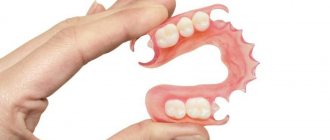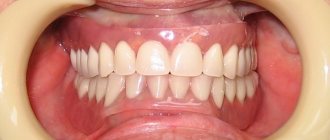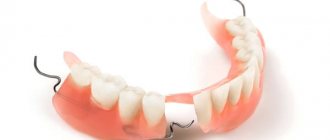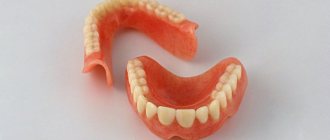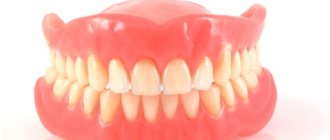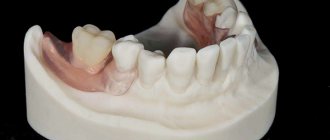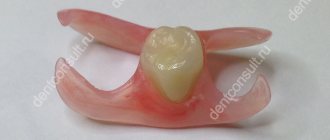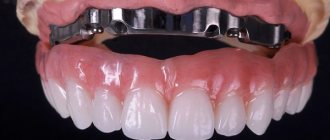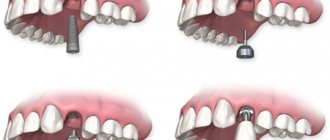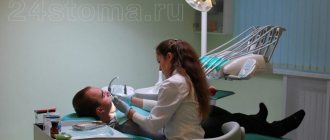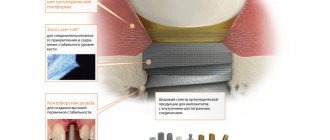Acree Free removable dentures are the best option for patients with monomer intolerance and those who cannot use other types of systems. For production, a material consisting of a special plastic is used, and the strength of the prostheses is superior to those made from acrylic.
A special feature of acrylic-free dentures is their absolutely natural appearance. The design of the prosthesis consists of three components:
- Gingival base – is characterized by exact compliance with the reliefs of the oral cavity, thereby achieving a tight fit to the gum.
- Crowns are rows of artificial teeth made from acrylic or ceramic. The hardness of the materials allows you to restore chewing function while maintaining high aesthetics.
- Fasteners masking fastener elements.
In the manufacture of Acri-Free, a special monomer is used that does not cause allergies.
By volume of prosthetic structures, there are:
- Complete – absence of all dental units of the jaw arch.
- Partial – replacement of four or more teeth.
- Microprosthesis – filling 1-3 tooth spaces.
What is the essence of prostheses - features of Acry-Free technology
Acry-Free dentures have several components: gum – it is translucent, therefore it is very aesthetic, looks natural and natural. Dental crowns fixed on a plastic base are artificial teeth. They are made from ceramics or plastic, which do not contain metals - so the prosthesis becomes very light and comfortable to use. The third required element is hooks, which are also created from acrylic resins that do not contain monomers.
REPROSTHETICS WITH ACRYLIC PROSTHETICS - RUB 200,000.
Re-prosthetics with an acrylic bridge on a metal frame (all included) up to 12 units.
Save RUR 30,000. Call now or request a call
When fixing the prosthesis on living supporting teeth, the hooks are located at their base and are, as it were, a continuation of the gums, therefore they are completely invisible to the interlocutors. If the design serves to replace the entire dentition, then the prosthesis is fixed exclusively on the gums, grasping them and firmly adhering to the mucous membrane. In this case, there is no need to use special glues and creams - the prosthesis is securely attached and does not fall out under load.
Indications for installation of Acry Free
With the help of a removable denture, you can restore either one tooth or an entire row of teeth. It is indicated for people with allergies to plastic or metal, as well as for those whose profession is associated with high rates of injury - the structure will not move even under intense physical activity.
Other indications include:
- Diseases that require a removable denture that holds tightly in the mouth. These include epilepsy, bruxism, temporomandibular joint dysfunction and weak jaw muscle tone.
- Tendency to damage soft tissues due to sensitivity of the mucous membrane, inflamed gums.
- Periodontal disease, when it is necessary to fix loose teeth so that they do not fall out.
Prosthetics are contraindicated in case of a pronounced gag reflex, significant atrophy of the bone plate of the jaw and ulcerative lesions of the mucous membrane, as well as if the patient is taking drugs that destroy the artificial crown.
“Acry-Free is a monomer-free material that is flexible and durable. It can be used to create thin, light products.
Let's list the advantages of Acry-Free. The material has no toxic effect on soft tissues, so a prosthesis made from it is an ideal solution for patients with allergies to plastic. The design lasts up to 7 years. The system is fixed without metal structures. The translucent base looks natural in the mouth. Patients adapt to the prosthesis quickly and painlessly. The system can be used during adaptation after implantation. And, finally, its cost is quite affordable,” - dentist, orthopedist Dentalab Stepanov Evgeniy Borisovich.
Features of Acry Free material
Acry-Free is a modern patented monomer-free material that has elastic properties and is several times more durable than, for example, acrylic. For the manufacture of orthopedic structures, the Acry-Free method of thermal pressing of granules (Acry-Free)1 is used. The composition of the material makes it possible to make dentures much thinner and lighter than many other removable structures. Acry-Free dentures can be easily polished and repaired, which significantly extends their service life. In addition, the material does not cause allergies.
Prosthetics price
The cost of making dentures depends on many factors. The key ones are:
- Type of prosthesis. A full removable denture will cost more than a partial or micro denture.
- Quality of materials. The use of certified high-quality materials will also affect the total cost of the procedure.
- Dentist qualification. An experienced dentist is able to make more accurate calculations before prosthetics, which will ultimately affect the patient’s comfort.
How the structure is installed
If there are appropriate indications, the specialist evaluates the clinical picture and determines the exact number of teeth to be replaced. If some of the remaining teeth are severely decayed or loose, they may need to be removed. After this, the doctor takes a plaster cast of the jaw, which is sent to the dental laboratory, where the structure is created. The manufacturing process involves the use of special heat-pressed acrylic granules, from which the finished device is cast. Next, hooks and clasps are attached to the product to secure the entire structure on the supporting teeth (model for partial tooth replacement).
As soon as the prosthesis is completely ready, it is sent for fitting. If the structure “sits” normally, but there are minor errors, the orthopedic surgeon himself sands them off until the product shrinks completely. If the inconvenience is significant, then the prosthesis is sent back to the laboratory for revision. When everything is ready, the doctor shows the patient how to properly remove and put on the device and explains how to care for it.
How to install Acry Free
Before installing the structure, the dentist examines the oral cavity. If there are inflamed teeth, he treats them or removes them. Next, he takes a cast of the jaw and sends it to the laboratory, where the prosthesis is made. When the product is ready, it is tried on and then adjusted so that the patient can wear it comfortably.
Prosthetics are performed as follows:
- The partial one is attached using clasps to the supporting teeth. Transparent hooks tightly cover the crowns, but remain invisible.
- In case of complete edentia, the system is secured thanks to the suction effect of the soft base, which tightly grips the gums.
- on the upper jaw . The base of Acry Free is thinner than other removable appliances, it takes up less space in the mouth and does not fall out of the upper jaw.
In case of complete edentia, the structure can also be installed on supporting implants or mini-implants. Typically, the dentist uses the All-on-4 protocol: implants four implants and then attaches the structure to them.
How often should adjustments be made?
It is important to understand that Acri-Free is a classic removable denture. Therefore, it does not protect against bone atrophy (this will be discussed below). This means that the bone along with the gums will sink and sag without receiving the proper load. Therefore, the system will cause discomfort and will not fit well in the oral cavity. That is why you will need to regularly visit your orthopedist to correct the product. In particular, the first visit should be in about a month. The second and third - every 2-3 months. Preferably no less often. However, you yourself will understand that it is time to see a doctor, because the prosthesis will cause inconvenience and, possibly, even pain.
Underwater rocks
Despite the obvious advantages of acrylic-free dentures, they are still imperfect and have some operational features:
- Long period of adaptation. Due to the physical properties of the material, the denture is quite soft, which requires long-term adaptation.
- Color change. Taking certain medications can change the color and transparency of the prosthesis base, making it visually more noticeable.
- Problem with clasps. Some patients note that the hooks that secure the prosthesis to their own teeth break off. This defect is easily eliminated, since acrylic-free dentures can be repaired in a regular dental clinic.
- Bone tissue atrophy. This disadvantage is inherent in all removable structures. Pathological changes in the bone occur due to uneven distribution of the load on the jaw when chewing food. To reduce atrophy, dentists recommend not removing dentures at night.
Acri-Free prostheses: advantages and disadvantages
Modern removable dentures have many undeniable advantages. Here are the main ones:
- softness and lightness: these characteristics make the prosthesis very comfortable and convenient,
- quick addiction
- low cost: Acri-Free prostheses belong to the middle price category, despite their significant advantages,
- no allergic reactions to metals or plastics,
- quick production and easy maintenance,
- the ability to adjust and repair the prosthesis if damaged,
- fixation of the prosthesis during bruxism,
- additional splinting effect for minor tooth mobility,
- high aesthetics of the prosthesis,
- no need to remove the denture from your mouth at night,
- the prosthesis is smooth, that is, less susceptible to the accumulation of food debris and plaque,
- non-toxic.
The main disadvantage of Acry-Free dentures is their reduced elasticity compared to similar nylon structures. On the other hand, this can also be considered an advantage. Dentures are less susceptible to deformation, the chewing load is better distributed, and therefore the gums and supporting teeth are practically not injured. After getting used to it, the denture will be more comfortable and durable. Another drawback, characteristic, however, for all types of removable prosthetics is that the bone tissue does not receive the proper load and atrophies over time.
Another disadvantage is the complete covering of the palate if restoration of a large number of teeth is required (that is, if the design is designed for two sides at the same time). This is how the systems are attached to the oral cavity. This leads to the fact that some patients react quite strongly to the presence of such systems - in particular, food distortion and an increased gag reflex occur.
Pros and cons of Acry Free
According to experts, Akri Free are one of the best prostheses in their class. However, while they have many advantages, they also have their disadvantages.
- Comfortable to wear
- Aesthetic appearance
- Affordable price
- Maintains shape
- No need to grind adjacent teeth for installation
- No dietary restrictions
- Resistance to dyes (foods, drinks)
- No load on the bone
- Fairly high price
The table above is compiled based on reviews from specialists and patients, for whom different characteristics of Acree Free are important. Owners of dentures rejoice in their aesthetics, and dentists note the functionality and hypoallergenicity of the material from which they are made. Thanks to the lightness and elasticity of the prosthesis, getting used to it occurs quickly, and the tight attachment to the gum helps keep diction unchanged.
The prosthesis is guaranteed for 5-7 years. Acry Free is resistant to plaque formation - all you need to do is clean it twice a day and rinse your mouth after every meal. To extend the service life, it is better to regularly use special products. The prosthesis needs to be adjusted and repaired only in the clinic, then its service life will be maximum. After installing Acry Free, injury to the oral mucosa is eliminated, since the structures are made from a fairly soft and plastic material.
Comparison with other types of prostheses
As mentioned earlier, Acri-Free dentures are less elastic, do not contain monomers and are non-toxic. Acry-Free is one of the few dentures that are used for bruxism, an insidious disease in which the patient (usually at night) strongly clenches both jaws. In this case, restoring teeth with dentures is rarely possible, since the structures cannot withstand too much pressure. Also, the Acri-Free material has high aesthetic properties.
To evaluate the advantages of Acry-Free dentures, it is worth comparing them with other types of orthopedic devices. Below we have reviewed the key advantages of the model over its main competitors.
Comparison with clasp structures
Clasp dentures are indicated only in cases of partial absence of teeth, since they necessarily provide supports for fastening and the presence of a rigid metal base. Their distinctive feature is the arc, which runs both inside the prosthesis and from the side of the tongue or palate (if necessary), which makes it possible to significantly reduce the size of the entire structure. In this regard, clasp models are often chosen for installation on the upper jaw, since they do not have a massive palatal overlap, which often causes a gag reflex in patients and distorts the taste of their favorite dishes.
On the other hand, the aesthetics with such a prosthesis may be somewhat worse than in the case of Acri-Free. But only if the fastening elements are metal clasps that fall into the smile zone. But Acry-Free is suitable for patients prone to metal allergies.
Comparison with nylon models
Classic nylon prostheses also have fairly high aesthetic characteristics, but Acry-Free still has a larger list of advantages. So, for example, they retain their original appearance for quite a long time, while nylon models change color and become rough after just six months or a year. The Acri-Free design is based on a more rigid base, slows down the processes of bone tissue atrophy, and is less likely to allow food particles to get under the prosthesis. In general, patients report a higher level of comfort, particularly when chewing food.
In addition, nylon systems are more elastic, which has a very negative effect on their performance characteristics - they quickly stretch and completely stop giving load, and do not fit well in the mouth.
“I used to wear regular nylon prostheses, and then, on the advice of a doctor, I switched to acryfree. The difference, frankly, is colossal. Firstly, I got used to them very quickly, literally in a week. Secondly, they are really more comfortable, fit securely in the mouth and do not fall out. In a word, I am very pleased that I chose this particular prosthetic option, although maybe this is only true for me...”
Anastasia V.K., Saratov, from correspondence on the forum www.32top.ru
Comparison with acrylic models
If we compare Acri-Free with acrylic structures, then first of all it is worth highlighting the hypoallergenic nature of the material, which does not contain monomers. In addition, Acry-Free is a more compact and lightweight product, which improves the level of comfort when wearing it. It is much more durable, holds securely in the mouth and provides fairly high aesthetics. On the other hand, it has a less rigid base and is not as comfortable when chewing food. Accordingly, such a system costs 1.5-2 times more.
BEST REMOVABLE DENTURE - 20,000 rub.
All manipulations for the manufacture, installation and fitting of the prosthesis, including impressions, are included.
Save RUB 10,000! >> Call now or request a call
Opening hours: 24 hours a day - seven days a week
Indications and contraindications
Installing a removable denture will help to easily and effectively solve the problem of missing teeth and avoid negative changes in the volume of the jaw bone tissue. In addition, the following conditions are indications for the use of this type of prosthetics:
- signs of hypersensitivity when wearing other structures;
- weak gums;
- metal allergy;
- absence of one or all teeth.
It is rational to use them if there is periodontitis or symptoms that make wearing dentures from other companies unsafe for patients (for example, bruxism).
There are almost no restrictions on the use of structures. Cases of epilepsy are considered separately, but even with such pathology, prostheses are often allowed to be used.
Alternative types of dentures
If for some reason the patient does not have the opportunity to install Acri-Free, you can consider alternative options for replacing missing teeth:
- in case of partial absence of teeth: it is possible to use various clasp structures, including flexible prostheses “Quadrotti”,
- in case of complete absence of teeth: it is possible to use hard acrylic dentures or soft dentures made of nylon and polyurethane, but more often the choice falls on Acri-Free dentures, since this material combines the advantages of soft dentures and structures with a rigid base.
When choosing a suitable prosthesis, the orthopedic surgeon takes into account a large number of nuances and individual characteristics of the patient’s oral cavity, so that the orthopedic design is as comfortable as possible for the patient.
Types of Acry Free prostheses
The system consists of three parts - a base that completely follows the contours of the gums, artificial crowns, and fasteners.
Depending on how many teeth need to be restored, there are three types of dentures. In case of complete edentia - the absence of all teeth - a complete one is installed. To replace more than four teeth, a partial one is made, which is attached with clasps - semicircular hooks made of the same material as the base of the denture. If it is necessary to restore from 1 to 3 teeth, a microprosthesis is installed. A microprosthesis can replace missing teeth in different places in the jaw, but each tooth will require a separate design.
Service life and how to care
The service life of Acry-Free prostheses is from 5-7 years. Careful care will significantly increase the life of the product. The denture does not need to be removed at night every day and placed in a special container - it is enough to clean the artificial teeth and gums from plaque in the morning and evening with a brush and toothpaste. It is also recommended to periodically, at least once a week, make special antiseptic baths that will protect the structure from destruction, further clean it and give the teeth a special shine. The design should be adjusted as necessary.
Read on the topic: how to properly care for removable dentures so that they last as long as possible.
Rules of care
There is nothing difficult in caring for removable dentures, but it must be constant so that the structure lasts a long time and does not lose its aesthetic appearance and useful functionality. Acri Free needs to be cleaned daily - in the morning and before bed, as well as after each meal.
To clean a replacement denture, only specialized dental antibacterial solutions should be used. The surface of the structure should be cleaned with soft brushes and pastes without abrasive elements in the composition. It is not necessary to remove the product during the night.
From time to time, it is necessary to pay a visit to the dentist, where an expert will assess the condition of the prosthesis and, if it turns out to be appropriate, restore and polish it. The average period of operation of the structure is about 7 years.
Cost of dentures
Acry-Free dentures, unlike their soft and flexible counterparts, are a very inexpensive denture option, while being aesthetic, more comfortable and reliable. The price of the finished structure directly depends on its size, that is, the number of teeth being restored. So, for example, in dental centers belonging to the middle price category, a partial Acri-Free structure can be installed for about 30 thousand rubles. The cost of a complete prosthesis will be from 40 to 50 thousand rubles. The indicated prices include the doctor's work, materials, and guarantees.
- According to the manufacturer of the material - Uniflex...
Author: Vasin Yu. A. (Thank you for your help in writing the article and the information provided)
